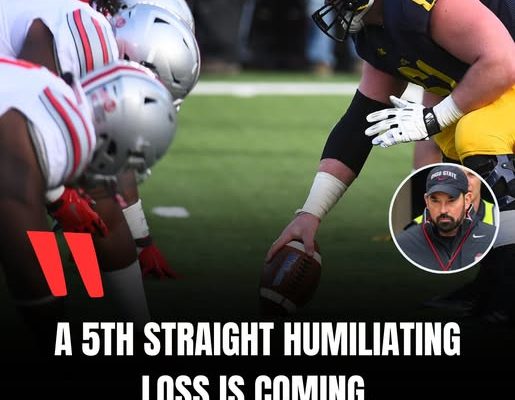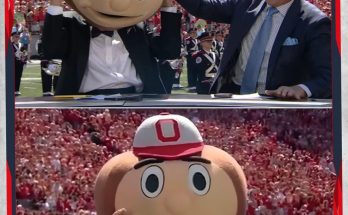The conversation around Ryan Day has taken a sharp turn, and nowhere is that more apparent than in the wake of Ohio State’s fourth consecutive loss to Michigan. For many Buckeye fans, winning a national title was supposed to be the ultimate trump card, a trophy that silences criticism and ensures a coach’s legacy is cemented. But for Day, the narrative is proving far more complicated. His inability to beat Michigan has reached a point where even the glow of national glory can’t shield him from ridicule, mockery, and the simmering frustrations of one of the most passionate fanbases in college football. The fact that Ohio State has maintained elite talent, put together championship-caliber seasons, and remained in the College Football Playoff hunt makes the consecutive defeats sting all the more. For Buckeye Nation, beating Michigan isn’t just a goal—it is the requirement, and it is a failure Ryan Day now wears like an immovable scar.
The Ohio State–Michigan rivalry has always transcended football. It is tradition, culture, identity, and a battle that stretches across generations. Legendary coaches at Ohio State like Woody Hayes, Jim Tressel, and Urban Meyer defined their tenures by what they did against the Wolverines. For Meyer, his perfect 7–0 record against Michigan was a badge of honor that elevated his place in Buckeye history, no matter what struggles or controversies surrounded him. For Day, the inability to win this game has left him in an impossible position. A national title is no small feat, yet the sting of repeatedly falling short in the rivalry overshadows it in the minds of many fans. After all, the program was not just built on trophies but on the sacred standard that Michigan must be conquered.
Critics of Day point to his early reputation as the young offensive guru who inherited a powerhouse from Meyer. His first few years suggested he could maintain the machine, with Ohio State’s offense continuing to light up scoreboards and quarterbacks under his watch piling up NFL-level production. But those successes are increasingly dismissed as hollow when contrasted with the brutal reality of the last four Novembers. Each time Michigan has walked away victorious, the narratives have grown harsher. Pundits and rival fans alike joke that Day could go undefeated every other week of the season, hoist another national title, and it still wouldn’t erase the failures against “The Team Up North.”
The way these losses have unfolded only amplifies the issue. Michigan hasn’t just squeaked by; they have often outmuscled, out-executed, and out-toughed Ohio State, challenging the very identity the Buckeyes prided themselves on for decades. The Wolverines’ physical dominance has reshaped the perception of the rivalry, flipping a script that once heavily favored Ohio State during Meyer’s reign. Every year Day insists that his team is built to compete with Michigan, and every year the results on the field say otherwise. That growing disconnect between promises and performance is fueling the mockery. A national championship in the trophy case looks great on paper, but to many Buckeye loyalists, it feels like fool’s gold if it comes alongside a humiliating streak of losses to their most hated rival.
What makes the ridicule particularly biting is how Day’s own words and actions have added to the pressure. He has been vocal about the rivalry being the central focus of the program, insisting that beating Michigan is emphasized year-round. Yet every defeat chips away at that credibility. To outsiders, it has become easy to mock the idea of “The Game” being a 365-day obsession when Ohio State can’t deliver on the field. For Michigan fans, this is vindication after years of torment under Meyer; for Ohio State fans, it is a cruel reversal of fortunes they never imagined possible. National pundits pile on with jokes about Day’s “Michigan problem,” and social media has become a constant echo chamber of memes highlighting his struggles.
The worst part for Day is that Ohio State’s administration and athletic department remain supportive of him—at least publicly. He continues to recruit at an elite level, keeps Ohio State relevant on the national stage, and has the program consistently positioned as a contender. But in Columbus, that support is almost irrelevant if he cannot solve the Michigan riddle. The fans are restless, and boosters who pour millions into the program are unlikely to tolerate a coach who keeps falling short in the one game that defines the entire season. No matter how many playoff appearances or conference championships Ohio State stacks up, the conversation inevitably circles back to Michigan. “Can’t beat Michigan” has become the refrain used to dismiss everything else Day achieves.
The irony is striking: coaches at other schools would be celebrated endlessly for bringing home a national championship and keeping their team at the forefront of the playoff picture. At Ohio State, however, the bar is different. The combination of expectations and tradition makes it possible for a coach to be simultaneously successful and mocked. That’s the tightrope Day is walking. On one side is the admiration of those who recognize the difficulty of winning at the highest level; on the other side is the unforgiving reality of Ohio State’s rivalry culture, which leaves no room for compromise. Right now, Day is leaning dangerously close to the side where mockery outweighs respect.
The comparison to John Cooper, the former Ohio State coach who consistently won games but struggled mightily against Michigan, is one that Day surely dreads. Cooper’s inability to win “The Game” overshadowed everything else he accomplished, and his legacy is still haunted by that failure. For Buckeye fans, the fear is that history is repeating itself in real time. Day’s national title might save him from the same fate in the record books, but it cannot protect him from the ridicule of being seen as the modern-day Cooper, a coach who could beat everyone but the one team that mattered most. The idea of carrying that stigma is enough to erode the goodwill a championship would normally provide.
The situation has reached a point where even winning another national title might not reset the conversation unless it comes alongside a victory over Michigan. That is how deeply ingrained the rivalry is in Ohio State’s culture. Day could hoist the College Football Playoff trophy in January, and the jokes would still fly in November if Michigan once again walks away the victor. For his critics, the national title will always come with an asterisk, a reminder that he failed in the most important battle. For his supporters, defending him becomes harder with each loss, no matter how much hardware he brings home.
Day’s plight speaks to the unique pressure cooker of elite college football. At most schools, winning at the highest level buys security, longevity, and goodwill that shields a coach from mockery. At Ohio State, it is only part of the equation. A coach’s true currency is measured in wins against Michigan, and until Day proves he can deliver in that arena, everything else feels diminished. This is why he remains a lightning rod for criticism. Even those who acknowledge his broader success struggle to defend him when the conversation inevitably turns to the rivalry.
For Day himself, the weight of these losses must feel immense. Every year the buildup to the game grows larger, every year the stakes feel more monumental, and every year the disappointment grows heavier. The mocking is no longer just about football; it has become personal. His image as a leader, motivator, and program-builder is questioned through the singular lens of The Game. Rivals see him as a coach who can win against everyone else but crumbles when it matters most. Fans fear he has become trapped in a cycle that mirrors Cooper’s, unable to break through no matter how strong his team looks on paper.
In many ways, the national title Day delivered only intensifies the frustration. Instead of serving as a shield, it acts as a cruel reminder that Ohio State is capable of reaching the mountaintop but still incapable of conquering its most important hill. The contradiction fuels the mocking: a championship coach who still cannot validate himself in the one rivalry that defines his job. It is the kind of paradox that few programs in the country would ever encounter, but at Ohio State, it is reality.
As things stand, Day’s legacy hangs in the balance. A national title ensures his name will not be forgotten in Buckeye history, but the shadow of Michigan looms larger with every loss. Until he changes that narrative, the mockery will continue, and the perception that even ultimate glory cannot save him will remain. In Columbus, the scoreboard against Michigan is the ultimate truth-teller, and for Ryan Day, that scoreboard has become a painful, unrelenting adversary that no championship can silence.



